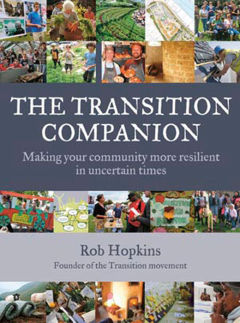Rob Hopkins explores how local communities can become more resilient and, in particular, less damaging to the global environment.
Author: Rob Hopkins
Reviewed by: David Towell
I recently offered a review on this site of Tim Jackson’s Prosperity Without Growth. If this book is an economic theory for sustainable development, Hopkins provides a promising account of the practice in his book The Transition Companion.
The Transition movement, starting in the U.K. but after five years spread now to more than 30 other countries, constitutes probably the most influential set of grass-roots initiatives towards sustainability.
I would say that this book is a gold mine of ideas, examples and useful processes, except that gold mines are finite and exhaustible: perhaps a better metaphor is an English meadow allowed to grow freely and demonstrate its ecological diversity and harmony. In 300 pages, Hopkins and his many collaborators discuss the why, what and especially the how of Transition, and report the enthusiasms which have been mobilised among citizens in many different localities. They summarise and illustrate no less than 43 ingredients and 21 tools which these local innovators have found useful under the five main headings of Starting out, Deepening the initiative, Connecting to more people, Scaling up locally and Seeking to inform national and global change. This is great stuff although, at least on my reading, the strategies so far devised to move to the larger scale remain relatively thin.

Transition towns started as a response to the challenges of ‘peak oil’ and climate change: producing local ‘energy descent plans’ i.e. to achieve very small carbon foot prints, remains the central driver. The movement envisions resilient communities delivering (as far as possible) localisation in green energy production, the food economy and construction. It also recognises that this resilience requires that we change ourselves as well as our environment.
Particularly welcome, The Transition Companion promotes processes of change based on openness and inclusion, recognising that successful initiatives depend on engaging the greatest range of local voices and experiences, across the diversity of class, culture, ethnicity, etc. To this end there are useful discussions of good listening and respectful communication, effective meetings (World Café and Open Space get specific attention) and the significance of celebrations. There is also attention to learning from the experience of elders and involving young people.
The book argues that the future decentralised economy necessarily requires new social arrangements designed with social justice at their core.
The publisher is Green Books.
The Transition Companion: Making your community more resilient in uncertain times © Rob Hopkins 2011.
Review of The Transition Companion © David Towell 2012.
All Rights Reserved. No part of this paper may be reproduced in any form without permission from the publisher except for the quotation of brief passages in reviews.